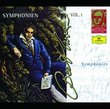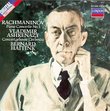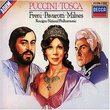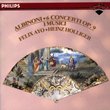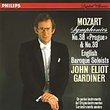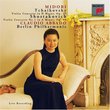Very clear recording, sometimes oversophisticated (snif)
sphaerenklang | UK | 03/11/2001
(3 out of 5 stars)
"The Mendelssohn quintets are rarely performed or recorded, so any new recording is welcome. L' Archibudelli come from the historically-informed school of performance (using gut strings, for example) and their recording is nearly unique in this. If you are allergic to the period-instrument string sound - it tends to be leaner and more "reedy" - then you will not like this disk, but I found it easy to get used to, in these works where the interpretation is more important than sheer sound quality. There are a few loud passages where I felt that the instruments are being forced too hard and the tone becomes harsh, but overall it is not a problem. The performances have precision, plenty of energy and enthusiasm, and delicacy in many places where it is required, and sometimes reach the rare point where the music seems to be speaking to the listener directly, where you would not want to change anything about the interpretation. However, I did not like all aspects of the playing: the group seemed to be trying too hard to make the music "expressive", putting in extra nuances which sometimes detracted from the direct expression of the music. Also the tempo for the second quintet's slow movement (marked Adagio e lento) seemed much too fast, maybe missing some of the depth of the music. But the worst fault is the (very audible) SNIFFING! I don't know how string players get away with this, maybe they believe it makes them more rhythmical, but the recording is so clear that I could hear every contraction of a player's nostrils. It's very distracting, particularly when a rest in the music (intended to be a silence!) is filled by an nasal intake of breath, or at various points when it seems to be necessary to some violinist's interpretation to sniff regularly, once a bar. Perhaps the recording could be remastered to reduce this! So, not my favourite chamber-music disk, but if you don't mind the sniffing then you won't regret buying it. I bought the set of the same music with the Octet and Quartet no.2 performed by Hausmusik - see that review, where I compare the two, much to the benefit of the Hausmusik recording."
The Quintets Presented with Less than Ideal Trappings
M. C. Passarella | Lawrenceville, GA | 05/29/2009
(3 out of 5 stars)
"As the mostly unhelpful notes to this recording state, Mendelssohn's to string quartets are divided by almost 20 years, but this is hardly in evidence. Both are light, dancing, youthful-sounding works, the Second (1845) written in the flush of the excitement over no less than two job offers from German royalty. The First was written in 1826 but revised six years later, when Mendelssohn replaced the original slow movement with the current elegiac one and reversed the order of the inner movements. Fortunately, he retained the giddy scherzo, one of his finest, a seeming jig for gnomes and slightly malevolent fairies, that recalls Mendelssohn's evergreen Midsummer Night's Dream Overture, penned the same (his seventeenth) year.
In fact, I prefer the First Quintet, which seems fresher and downright more attractive than the Second. In the Second, the finest movement is the relatively serious slow movement, which somewhat eclipses the more conventional fast movements, though there is much to enjoy here as well if you set your mind to it.
The performances by Archibudelli are mostly very acceptable ones. But there are a couple of large "buts" to contend with. First, I have never heard so lead-footed a performance of a Mendelssohn scherzo as their rendition of the one from the First Quintet. It just about kills the whole performance for me, though they do a much more creditable job in the other movements. Second, the stark, vibratoless sound they produce, putatively adhering to authentic performance practice, is exacerbated by the chilly acoustics afforded by the recording venue, a church in Holland. If the performance of the Second Quintet hadn't been pretty much unexceptionable (which it is), I'd feel content giving the performance two stars, but I squeaked out an extra one since half stars aren't available. However, if you want period-authentic performances of these two amiable works, look no further than Hausmusik on Virgin Veritas, a much sounder choice all around.
"
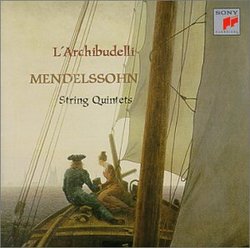

 Track Listings (8) - Disc #1
Track Listings (8) - Disc #1